Most people refer to a corporate wiki and a knowledge base interchangeably. However, the two types of knowledge management platforms are distinctly different. Furthermore, each option has its pros and cons. We’ve put together this head-to-head comparison to help you decide between investing in a corporate wiki vs. a knowledge base.
Corporate Wiki Pros and Cons
Pros
- Collaborative knowledge sharing and transfer
- Improved access to knowledge
- Faster content population
- Real-time content updates
Cons
- Lack of structure
- Minimal content oversight
- Limited analytics
Knowledge Base Pros and Cons
Pros
- Clear knowledge management structure
- Authoritative content
- Robust analytics
- Fewer errors
Cons
- Requires subject-matter experts
- Lacks real-time information sharing
- Slow content submission
Type of Knowledge Management Software: Knowledge Base Wins
A corporate wiki and knowledge base are similar in a lot of ways. Both knowledge management platforms allow you to document and organize important company information. This includes critical documentation such as team playbooks, product requirements, standard operating procedures, and onboarding checklists.
However, the two platforms take different approaches to knowledge management.
Wikis, for their part, take an open source approach to knowledge management. Employees can freely add or edit information on the corporate wiki in real-time. Wikipedia is perhaps the best example of how company wikis work.
On the other hand, knowledge bases take a more structured approach to information sharing. A dedicated team of subject matter experts is responsible for creating and maintaining corporate documentation. Therefore, there is a clear distinction between people who create the content and those who consume it.
Generally, corporate wikis have limited features compared to knowledge bases. For example, the typical corporate wiki comes with a text editor, version history, search, visualizations, access rights, and internal linking. In short, these features are limited to what you need to collaborate on internal documentation.
Knowledge bases are far more robust in terms of features. Aside from the essentials for creating and editing information, you get other valuable capabilities. For example, some of the best knowledge base software like ProProfs lets you create a corporate wiki, internal knowledge base, and online documentation & user manuals on the same platform.
Similarly, a knowledge base solution like Document360 offers custom domain mapping so you can use your company domain to host your documentation website. There’s also an analytics feature to identify broken links in your knowledge base articles.
Some knowledge base solutions even come with ticketing and other customer support features. You don’t expect to find this range of features with your typical corporate wiki.
The reason for this disparity is simple. Corporate wikis are designed to share knowledge within an organization. Knowledge bases are intended for internal and external use, which brings us to the next point.
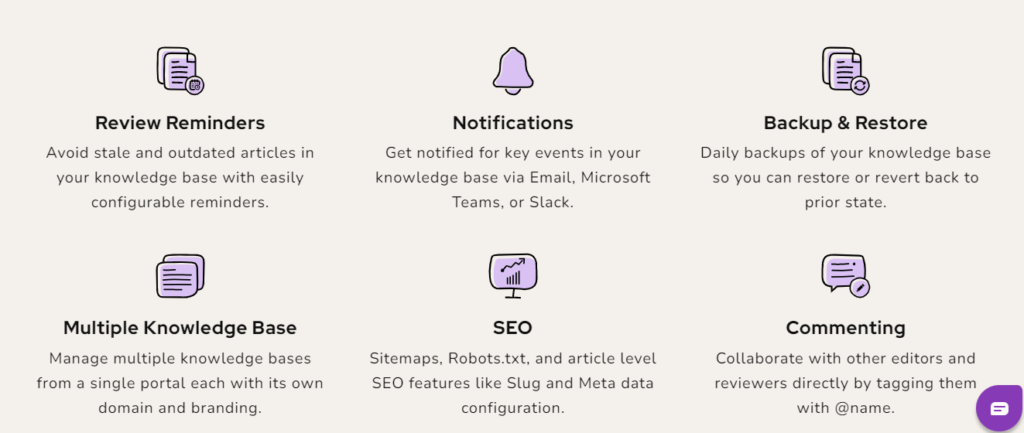
Public vs. Internal Access: Knowledge Base Wins
A corporate wiki is designed exclusively for internal knowledge sharing. Each company’s wiki might look different. But, you’re likely to find similar documentation across organizations, including:
- HR policies, employee handbooks, and staff manuals
- Standard operating procedure (SOP) and process documentation
- Company mission, vision, values, and culture
- Employee training materials
- Onboarding checklist
- Company strategy and roadmaps
- Organization best practices
- FAQs
- Troubleshooting manuals, tutorials, and how-to guides
On the other hand, a knowledge base can either be internal or public-facing. For example, an internal knowledge base may contain information similar to what you find in company wikis. Additionally, your company can use the same software to create a self-service knowledge base for its customers.
So, a knowledge base is better for creating private and public knowledge repositories. You’d have to use separate software for creating public documentation if you choose a corporate wiki. Most knowledge base software is flexible regardless of the type of information you wish to create.
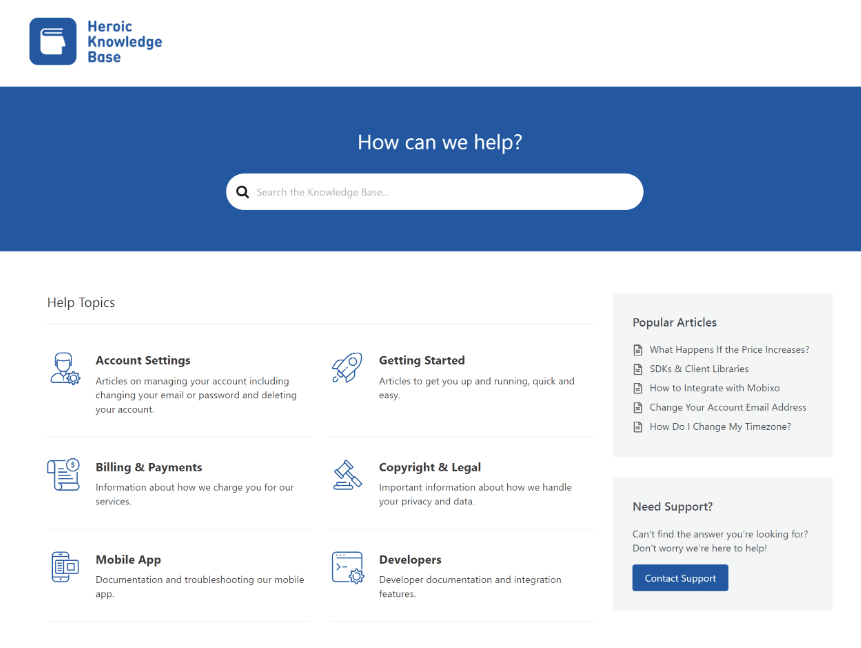
Text Editor: Knowledge Base Wins
Corporate wikis and knowledge bases come with a text editor. This is where contributors write and edit documentation.
However, corporate wiki text editors tend to be basic and outdated. Of course, there are exceptions. For example, Nuclino uses a simple drag and drop editor to create and edit content.
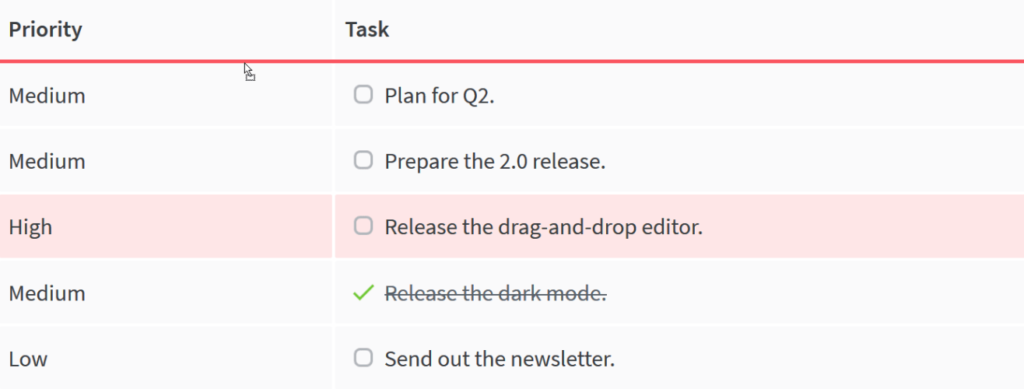
The editor allows you to easily reorganize paragraphs or move checklist items by dragging and dropping the text to the desired location. Even so, many corporate wikis do not have intuitive text editors compared to most knowledge base software.
Corporate wikis with advanced document editors are an exception rather than the rule. Since most document editors are intuitive, you may have difficulty convincing employees to contribute to the corporate wiki.
Furthermore, older corporate wikis require some HTLM knowledge to edit and publish documentation. This design puts non-technical teams at a disadvantage. Again, a steep learning curve may slow company-wide adoption if employees have to learn complex commands.
Modern corporate wikis rely on What You See Is What You Get WYSIWG formatting systems. This option is easier to learn than HTML code. However, there’s still a steep learning curve as employees need to know new formatting rules.
The typical knowledge base is designed for ease of use. Most software has editors similar to MS Word. So, employees feel at home right off the bat. You can also import content to your knowledge base software, including PDF files, word documents, and PPTs.
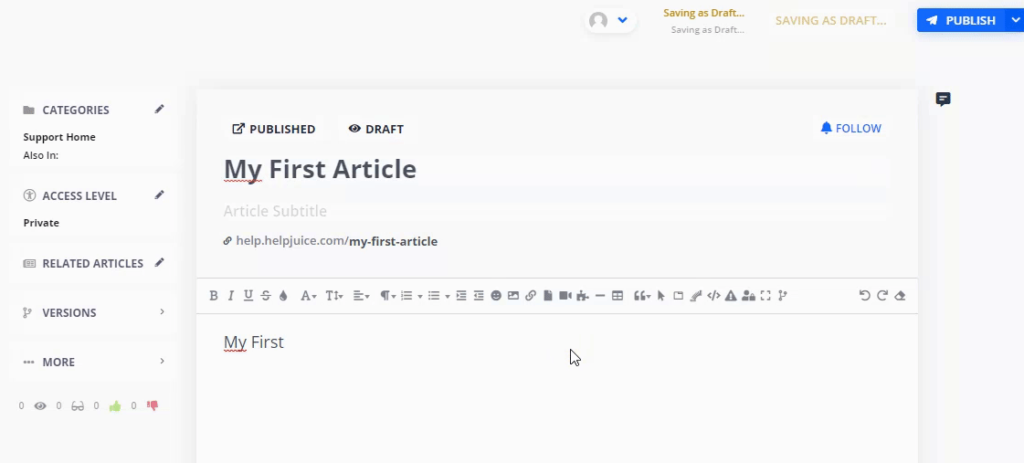
Analytics and Reports: Knowledge Base Wins
Analytics and reports help assess how employees interact with the company content. For instance, it might be helpful to identify the top contributors or the most searched topics. In addition, these analytics can help shape how the organization creates content for the best effect.
Most corporate wikis offer limited or nonexistent analytics and reporting features. This omission is hardly surprising since wikis aren’t meant to be public. Furthermore, wikis focus more on collaboration than content planning or hitting KPIs.
On the other hand, knowledge base software typically offers advanced reports and analytics. You get access to actionable data, including:
- Article views
- Article likes and dislikes
- Suggested articles
- Article performance trends
- Article feedback
Some knowledge base software has more robust reports than others. However, pitting the average knowledge base vs. corporate wiki reports is almost always a win for a knowledge base. It’s also one of the reasons many modern organizations have moved away from corporate wikis in favor of a knowledge base.
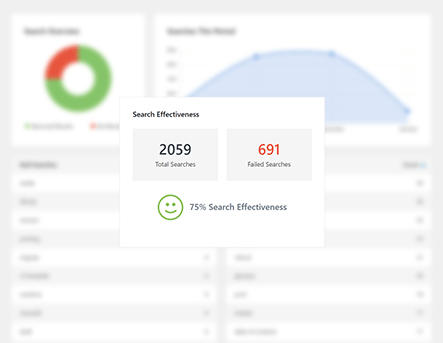
These are just some considerations when choosing between a corporate wiki and a knowledge base. However, there are still a few more comparisons to get through before you’re confident that you’ve made the right choice.
Accuracy and Content Authority: Knowledge Base Wins
The knowledge base proprietary structure is perhaps its main strength. The typical knowledge base has a team of dedicated content creators and managers. Ideally, this team is made up of authoritative subject-matter experts.
Wikis, on the other hand, take a free-for-all approach. Anybody is free to contribute or update information. It is possible to restrict the number of content producers since most corporate wiki software offers an access rights feature.
However, this approach beats the purpose of having a wiki in the first place. It’s great that employees can collaborate and share knowledge freely. But, the wiki starts to lose trust if there’s no way to verify the information’s source or accuracy.
The open-source wiki philosophy is particularly problematic when curating some company-wide documents. For example, you may not want employees to freely edit or add to your customer service procedures and HR policies.
Again, this limitation ultimately leads to using disparate software such as a company wiki and knowledge base. For instance, employees may use the company wiki to collaborate on general knowledge. However, they’d need to access the knowledge base for company-produced material such as HR policies or employee handbooks.
Finally, stale or outdated information is a significant problem with corporate wikis. There’s no clear ownership of information, such as a dedicated editor or fact-checker. In addition, most employees may be reluctant to take time off their official duties to update the corporate wiki.
A knowledge base, by design, assigns specific knowledge management roles. For instance, you may have a knowledge admin responsible for the administrative tasks required to maintain the knowledge base.
Similarly, knowledge contributors and publishers are responsible for creating and validating material and making it available on the knowledge base. The knowledge base’s inherent structure makes it a trustworthy source of company information.
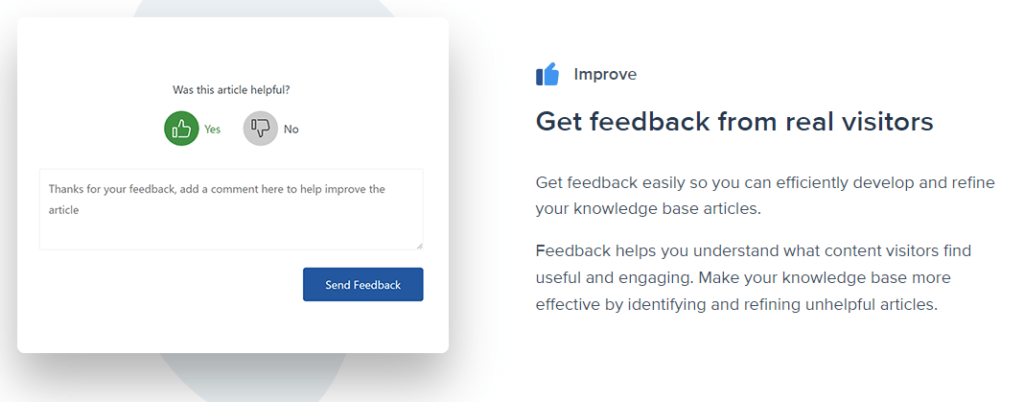
Search Functionality: Knowledge Base Wins
Corporate wiki and knowledge base software come with search functionality. It’s a valuable feature for finding specific knowledge quickly. Therefore, robust search functionality is critical for encouraging employees to use the corporate wiki or company knowledge base.
Thanks to Google, we’re used to instantly having relevant information at our fingertips.
Corporate wikis usually have dismal search functionality. It’s hardly surprising since the information in wikis is typically unstructured, lacking a search hierarchy. As a result, employees may need to visit multiple pages looking for specific material.
On the other hand, knowledge base software is designed with a search hierarchy in mind. As a result, employees can use keywords or search phrases to locate relevant information quickly. Therefore, you’re likelier to see employee engagement with a company knowledge base than with a wiki.
Of course, there are some exceptions. For example, modern wikis solve this problem by integrating the software with a powerful search engine. Still, insufficient search capability is a persistent problem with most corporate wikis.
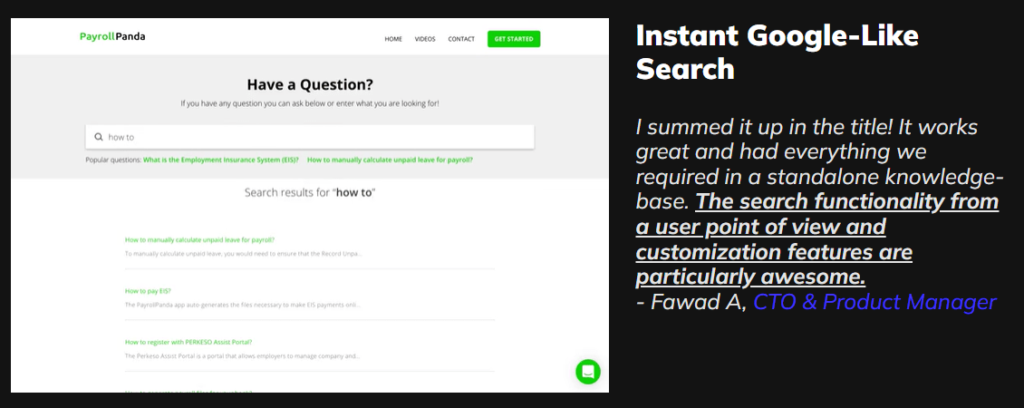
Collaboration: Corporate Wiki Wins
It’s hard to beat a corporate wiki regarding inner sourcing knowledge and collaboration. The free flow of information is one of the corporate wiki’s most attractive features.
Employees have extensive knowledge, experience, and insights. And, there’s no better way of documenting this extensive knowledge than in a corporate wiki if open collaboration is a priority.
The best part is that corporate wikis are perfect for cross-functional collaboration. Employees from various departments can share their experience, knowledge, and expertise. Therefore, corporate wikis are ideal for eliminating information silos in an organization.
A knowledge base is harder to get off the ground. You could have an empty corporate wiki and have employees populate it with information in a few months. However, you’ll need ready-made content to implement an internal knowledge base.
A knowledge base might also exclude some types of critical knowledge. For example, the content creation team may only include subject matter experts with demonstrable proficiency in their field.
Such a team naturally excludes employees with tacit knowledge, such as acute intuition or personal wisdom. But unfortunately, this knowledge is undocumented and lost forever when the employee exits the organization.
Wikis do a much better job of compiling all types of organizational information. You could have a vast database of explicit, implicit, and tacit knowledge pooled from various personalities, temperaments, professional experience, and domain knowledge.

Content Structure: Knowledge Base Wins
Contributing to a corporate wiki is exciting in the initial stages. Employees feel that their opinions and experience matter. New employees also access critical information that supplements the training and onboarding material.
However, the company wiki can quickly degenerate into an information dump. The content may be inconsistent. The knowledge gap is also an issue since there’s no plan for addressing specific topics satisfactorily before moving to the next one.
A knowledge base is inherently structured. There’s a dedicated team of writers, editors, and fact-checkers. There’s also a clear content strategy for adding and updating information.
A knowledge base is also highly customizable. You can change the basics such as brand name and logo, themes, fonts, and colors to fit your organization’s image. Wikis tend to have fewer customization options.
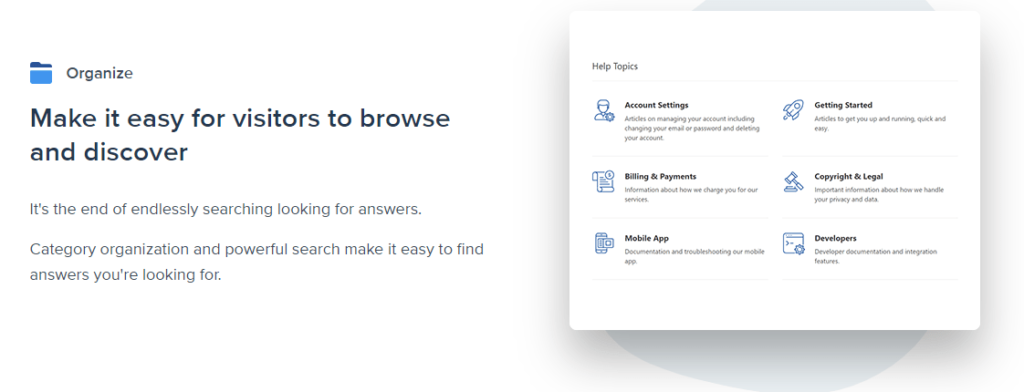
Knowledge Management Use Cases: Knowledge Base Wins
Lastly, the typical corporate wiki has fewer use cases. As a result, you’re more likely to need an additional technology stack to compensate for missing features.
For example, you can use a corporate wiki for knowledge sharing, team collaboration, and employee onboarding. That means you’d need to purchase and maintain additional software for customer support and customer service.
A knowledge base serves all the functions of a traditional corporate wiki. However, you can also use it as a self-service portal for customers, create product help documents, and much more.
Therefore, a knowledge base offers better value for money. You can do more with it. It’s also easier to maintain one software serving multiple knowledge management functions.
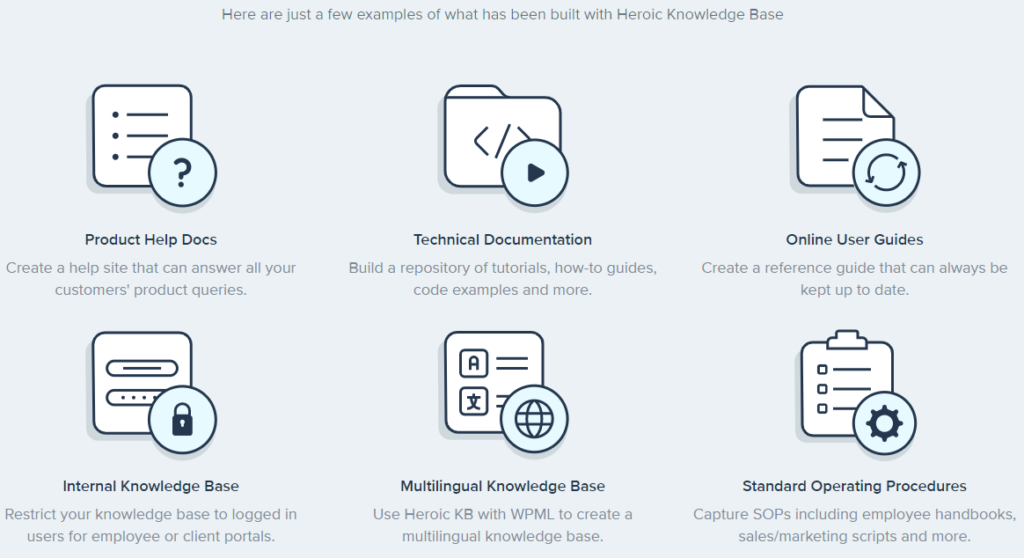
Final Verdict
Corporate wikis have been a staple in organizations for decades. They provide a simple solution for compiling and managing company knowledge. Corporate wikis are also instrumental in fostering a culture of collaboration.
However, the traditional corporate wiki is outdated, possibly even obsolete. Knowledge base systems offer better and more advanced knowledge management features.
Additionally, a knowledge base is better at serving up relevant information quickly. Information can soon get lost in the corporate wiki, given its unstructured format. There’s no point in compiling company information if employees can’t find what they are looking for in the first place.
